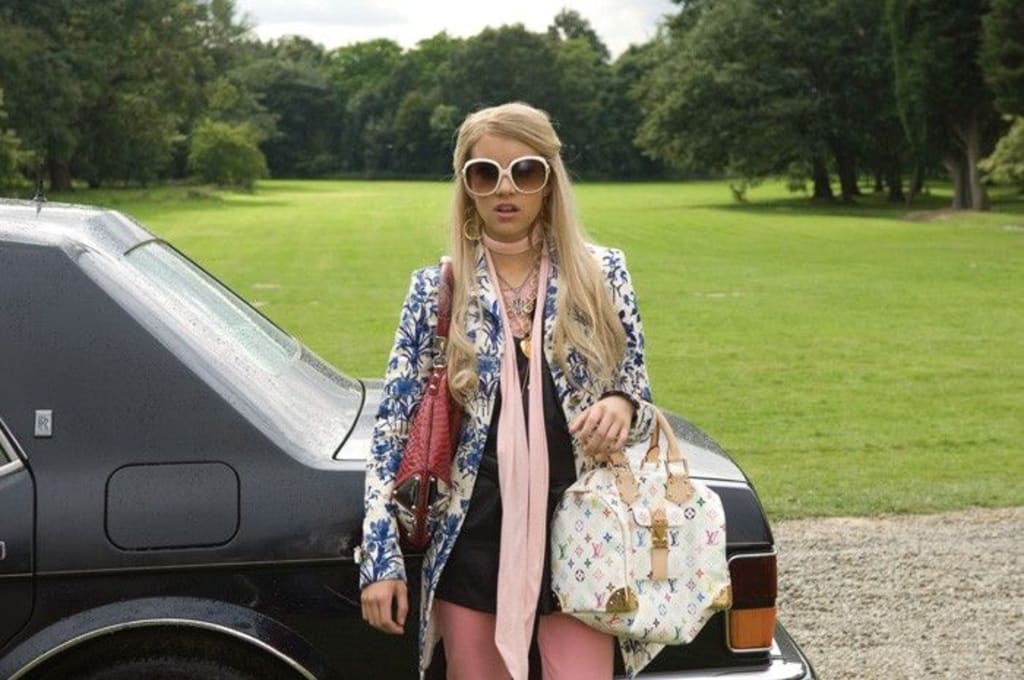Wild Child: a Feminist Masterpiece?
Our favourite early 2000's coming-of-age film, viewed from a feminist perspective.

[WARNING: SPOILERS AHEAD]
In case you are unfamiliar, the movie follows the story of Poppy Moore; a Malibu girl thrown into a British boarding school- 'Abbey Mount'- after a streak of misbehaviour. She tries her hardest to get kicked out and return to the glamourous lifestyle she left behind. In her efforts to get kicked out, she begins a romance with the dashingly handsome Freddie Kingsley and begins to learn the true meaning of friendship. As she puts it, 'Isn't it ironic how my ticket out of here just might be the reason I want to stay?'.
The film has strong themes of family, friendship and growth, laying the groundwork for some strong messages about the importance of female camaraderie to shine through.
'Who are we?': female interpersonal relationships.
(quote at 1:05)
Teenage girlhood and growing is summarised quite bluntly in that very quote: who are we? As Poppy and the gang (Kate, Kiki, Josie and Drippy) all pose for a post-dress-up-montage-selfie, they loudly say ask question, as a mantra Poppy taught them from Malibu. Judging by the way they say it, this question is more to show the ever-strengthening friendship between the girls, as they are now sharing phrases, as opposed to posing an important question about the confusion of growing up. But the sentiment stands, nonetheless. Poppy discovers herself through this movie, and it is only with the help of her four girlfriends that she finds who she is.
She starts her boarding school completely distinct from them, her lurid pink clothes and luggage providing a stark contrast to the drab blue dorm to demonstrate this. However, as the movie progresses and she moves her prejudices to one side, she mixes with them. They pick up the phrase 'who are we?', recited when taking a selfie, and she adopts classic terms such as 'horridious bitch'- a flawless insult, in my humble opinion. The colour palette of the dorm slowly becomes more pink also as she integrates into life at Abbey Mount. In true chick-flick fashion, the scenes between the group are so vibrant that you can feel yourself in them- the giggles shared when talking about Freddie in the baths is one of the first parts where I really feel their friendships are shining. I would argue that the friendship between Poppy and the others is purposely given more value than her relationship with Freddie, shown through the fact that the friendship is given far more screen time than the romance, and through one clip at the social in particular; during the 'final dance', a tradition that is normally romantic, leaving the viewer expecting a dance between Freddie and Poppy, the male character is notably missed out. Instead, all the girls put their arms around each other and dance together, telling us as viewers that the girlfriends take priority.
Another instance of the girls being valued over Freddie is the final shot of the movie. Although he went to Malibu with them, the final thing we see is all the girls jumping into the water- without him. Leaving us with that image firmly tells us that this is a story of friendship rather than romance. Of course, this final shot is also an ode to the opening scene, in which Poppy dumps her new step-mothers clothes into the ocean. Therefore, character development is shown as Poppy is no longer taking down other women, rather putting herself on the same level with them. Despite her seemingly happy appearance and reluctance to leave, her life in Malibu is clearly unhappy: she is struggling with the death of her mother and at a low point, shown by the fact that the camera literally looks down on her after she jumps into the water. As the camera is level with the girls as they jump in during the final scene, we can tell that she is at a better point in her life, due mostly to the self discovery fuelled by her friendship with the girls.
Her discovery is similarly aided by Mrs Kingsley. She lends Poppy a copy of Alice in Wonderland, a novel which parallels Poppy's own situation- young girl suddenly finding herself in a crazy new environment and having to navigate her way through. I scoured my copy of Alice in Wonderland to discover what value Mrs Kingsley thought it would bring to Poppy's life. Of course, reading about a character who is in a similar situation to you is always comforting, so maybe Mrs Kingsley just thought it would help Poppy settle in. Going deeper, Mrs Kingsley knew about the death of Poppy's mother, so possibly this book was to help her come to terms with it. Albeit a tenuous link, Alice learns that not everything has meaning or purpose, through a series of senseless riddles. Perhaps Mrs Kingsley hoped that Poppy may pick up on this, and reflect that no one is to blame for the tragedy, and that sometimes these things happen with no rhyme or reason and she should stop antagonising her dad and new step-mum. Another element of Alice in Wonderland that may have aided Poppy's character development is Alice's continually challenged ideas. She finds herself 'incorrectly' reciting poems she thought she knew- is this a metaphor for Poppy's Malibu conventions being challenged and undermined at Abbey Mount? Probably not, I doubt the producers of Wild Child intended for anyone to look this deeply into it.
The parallels are interesting, nonetheless. And it is undoubtedly due to Mrs Kingsley's help that Poppy develops as a character. She treats her with kindness and sympathy that more cynical characters do not think she deserves- at least, not without a bit of convincing.
Her growing resemblance to her mother is also a driver of growth. As she becomes more involved in lacrosse, and dyes her hair a 'natural' brown, she becomes more personable and sheds her defensive armour. Even posthumously, her mother helps her. One of the most vulnerable moments in the film is when she finds the photo showing that her mum was lacrosse captain, and soon after makes peace with her decision to 'face the music' and confess.
Therefore, it can be concluded that it is through Poppy's relationships to other women that she grows into a better person.
'Grade one a-hole, with a severe attitudinal problem': Harriet Bentley.
Harriet is clearly the villain in this movie: this idea is shown from the first scene she is introduced (including the iconic 'I'm sorry?' 'Apology accepted' line) and solidified throughout.
It is a common phenomenon that female villains are often presented as hyper-feminine (this YouTube video explains it well!: https://www.youtube.com/watch?v=FDEOZqnJMqI ), and often a root of their villainy is ambition. In Harriet this is not the case- her villainy lies more in her outdated ways.
She believes in hierarchy- shown by the fact that the first years are literally her servants and her belief that the order in the school is 'Teachers, prefects, scholars, dogs, vermin, Americans.' She hunts, which directly contrasts Poppy's vegetarianism, hinting that Harriet may have less empathy. She also only has one driving force for her actions- being with Freddie. Of course, it is not wrong to go out of your way to get the attention of someone you're attracted to, but getting his attention when he is seemingly disinterested is her sole motivator, and leads her to mistreat many other people, even going as far as restarting a fire and almost killing Drippy. She is also unnecessarily rude (though so is Poppy, the difference is that Poppy shows growth), and incredibly arrogant. The majority of these traits are not traditionally feminine, therefore it is not femininity in itself that is being blamed for Harriet's actions.
Assigning Harriet the motive of boy-obsession was carefully done- teenage girl's romantic desires as a whole were not mocked, as Poppy had a romantic arc, and Kate was briefly praised for kissing a boy, it is only Harriet's blind chasing of a boy who is clearly disinterested that gets scrutinised. Her arrogance and blindness to his indifference are mocked instead.
She also could be considered a product of the patriarchy. Her reliance on male attention is caused by overwhelming pressure on young women to base their worth on the approval of men, therefore her endless and harmful chasing of Freddie is evidence of insecurity. She also has a certain fixation on Poppy's height, constantly mocking her because she is short, yet short is the beauty standard. Harriet feels the need to take jabs at Poppy for this as she is insecure about her own height, as tall women are seen as less feminine. Her actions are not excused by this, rather explained, and her character can be seen as both a malicious personality and a product of her society.
This all means that the crafting of Harriet's character was not a lazy, misogynistic jab at traditionally feminine traits, rather a crafted array of genuinely negative views with depth to her motives. This shows that a villain can be made without making her fall into stereotypes.
'Nice work Kate': The Male Characters.
Poppy says that line to Kate when she sees her making out with a boy at the social, and Kate then quickly shoves him off to talk to Poppy, highlighting the disposable nature of men in the movie. The typical stereotype of women being treated as conquests on nights out is subverted, and instead it's men who are objectified in this way. Misandry and mistreatment of men in the same way that women are mistreated is not feminism, however in this movie it is fictional, and used to comedically and subtly highlight the normality of these behaviours in men.
Another subverted stereotype is men using women as a stepping stone to get what they want, (think 10 things I hate about you). In short, using people as a means to an end. Poppy uses Freddie in order to get kicked out of school, and inevitably falls for him in the process - the woman using the man this time. Again, mistreatment of men is not feminism, but the subversion of a trope to highlight common sexist themes in film can be.
I feel the need to mention the elephant in the room: Alex Pettyfer's stiff acting. His performance is notably quite emotionless, which brings forth the notion that strong acting is not required to portray the pivotal male character (Freddie), as there is no depth of emotion. He is just there to sit still, look pretty. [NOTE: This is not a comment on Pettyfer's career as a whole, just this individual performance]. Contrasting the in depth view we get of the female characters, Freddie is certainly one dimensional. Women take the forefront whilst the men fade into the background. Contrasting the norm where many films fail to pass the very simple Bechdel test, this film goes as far as to fail the reverse Bechdel test- something which is very uncommon.
Overall, the disposability and lack of rounding on the male characters, compared to the female characters flips what we would typically expect in a movie and therefore could be seen as a feminist commentary on sexism in the industry.
'Apparently California girls WAX their BUMS': The Portrayal of Femininity.
Initially, Poppy represents the manufactured and materialistic side of femininity- apparent bum waxing, fear of acne and weight gain, self tanning, and obsession with designer brands. None of these things are inherently bad, but they are symptoms of the pressures placed on women to conform to unrealistic standards, and this is what Poppy is initially striving for. Some of the 1st years admire her ultra-feminine look when she first arrives, setting her style of femininity apart from the rest, despite it's occasional toxicity. Her entirely pink colour palette creates a divide between her and the other girls, all dressed in blue, yet as the film goes on Poppy gradually incorporates other colours, and her signature pink is soon in the rest of the dorm.
Her femininity is shared and changed, but never removed. Rather than being scared of the carbs and sugar in a wagon wheel, she now bonds with her female friends over shared experiences. Her femininity is now shown in a more carefree and juvenile way, like during the dress up montage in the charity shop.
Another important thing to note is that femininity is never demonised. She never dismisses the fact that she's a 'girly-girl' and they all hold onto a love of typically feminine things, for example how she keeps her pink lacrosse stick the whole way through, where others have blue ones. It's subtle details like this which tell us that during Poppy's coming of age experience she doesn't fall victim to internalised misogyny, giving us a refreshing look on teenage girls and their collective experiences.
Overall, I don't actually think this film is inherently feminist. Unless a film has a strong message and teaches the viewer something, I would say it cannot be particularly feminist- not all entertainment needs to be political, but that's a whole other essay. In parts I haven't had time to mention Freddie makes sexist jokes which are glossed over, and Poppy treats Harriet with equal malice as Harriet treats her, which is quickly forgotten. However, when viewed through a feminist lens, strong themes and subverted stereotypes can be picked up. The writing is far less ridden with misogynistic archetypes than other films of this genre and time, and it an honest look into a coming of age story, without the voyeuristic oversexualisation we can too often see.
About the Creator
Hannah Macdermott
the rantings and ramblings of an inconstant mind.






Comments
There are no comments for this story
Be the first to respond and start the conversation.